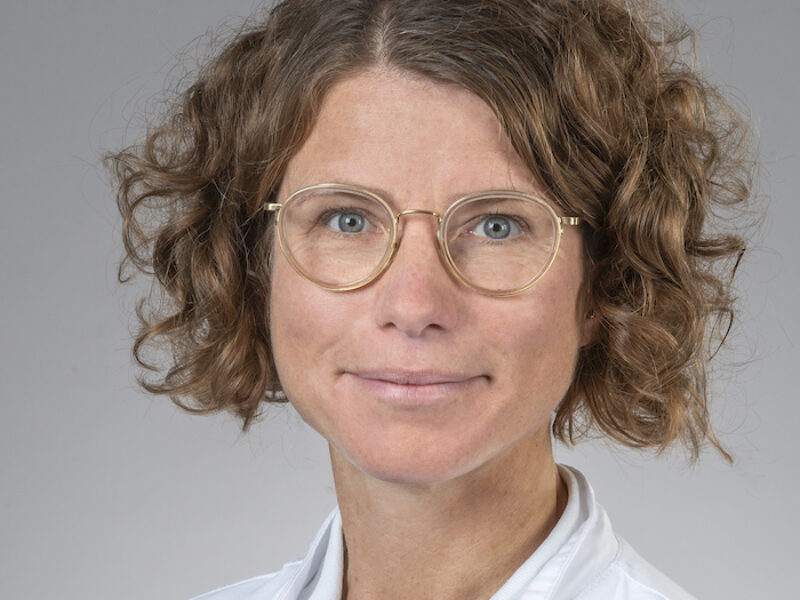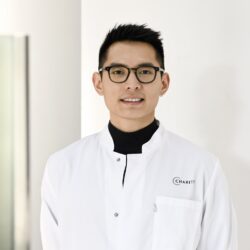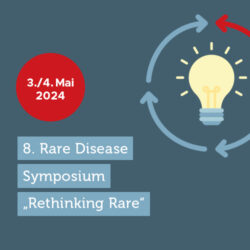Seltene Erkrankungen betreffen in acht von zehn Fällen Kinder und Jugendliche. Ihre Teilhabe am medizinischen Fortschritt hängt daher ganz entscheidend von engagierten Pädiater:innen ab, die sich dem Spagat zwischen Krankenbett und Labor mit Hingabe stellen. Um forschende Kinderärzt:innen auf diese anspruchsvolle Aufgabe vorzubereiten und ihnen die nötigen Freiräume für wissenschaftliches Arbeiten auf hohem Niveau zu verschaffen, setzt das von der Eva Luise und Horst Köhler Stiftung initiierte Forschungsnetzwerk Alliance4Rare unter anderem auch auf strukturierte Clinician Scientist Programme (CS4RARE). Diese ermöglichen den Teilnehmenden geschützte Forschungszeiten, in denen sie von klinischen Aufgaben freigestellt wissenschaftliche Projekte zu Seltenen Erkrankungen vorantreiben können.
Einige der Stipendiat:innen, die kürzlich ihre Arbeit aufgenommen haben, stellen sich und ihre Projekte vor.
Liebe Frau Dr. Knopf, Sie sind für das Clinician Scientist-Programm der Alliance4Rare ausgewählt worden. Was hat Sie motiviert, diesen besonderen Weg in Wissenschaft und Klinik einzuschlagen?
Im Rahmen meiner Facharztausbildung an einer großen Kinderklinik bin ich früh mit Seltenen Erkrankungen in Berührung gekommen, unter anderem auch mit Erkrankungen des Abwehrsystems. Während der Weiterbildung zur Kinderheumatologin lag mein Schwerpunkt auf den autoinflammatorischen Erkrankungen – sowohl den genetisch definierten als auch den nur phänotypisch einzuordnenden Entitäten. Bei Kindern und Jugendlichen mit diesen komplexen Phänotypen sind nicht immer Autoinflammation und Autoimmunität klar voneinander zu trennen. Um die gestörte Regulation der Entzündungwege besser zu verstehen, habe ich mich zunehmend mehr mit dem Thema Immundysregulation und Immunschwäche beschäftigt.
Seit März 2022 arbeite ich mit großer Begeisterung in der pädiatrischen Immunologie und in einem interdisziplinären Team. Dabei besteht eine enge Verbindung zwischen klinischer Arbeit und Forschung, die das Fach so interessant werden lässt. Es werden stetig neue krankheitsverursachende Varianten gefunden und neue Krankheitsentitäten beschrieben. Jährlich nimmt so die Anzahl der definierbaren Erkrankungen des Immunsystems zu. Das zeigt sich unter anderem an der Erweiterung der Gruppen in der Klassifikation der International Union of Immunological Societies (IUIS), die kürzlich um die monogenetischen Autoinflammationsentitäten und Erkrankungen mit Knochenmarkversagen erweitert wurde.
Woran arbeiten Sie momentan und was möchten Sie erreichen?
Aktuell arbeite ich am UniversitätsCentrum für Seltene Erkrankungen (USE) sowie im Fachbereich Pädiatrische Immunologie des Universitätsklinikums Carl Gustav Carus an der TU Dresden.
Mein Forschungsschwerpunkt liegt bei den Autoinflammatorischen Erkrankungen und der Suche nach neuen Biomarkern, um sowohl Krankheitsschübe vorhersagen zu können als auch eine bessere Therapiesteuerung zu ermöglichen. Unter anderem analysieren wir gemeinsam mit Kollegen aus Würzburg und Luxemburg die Genexpression bei Kindern mit SURF (systemic undefined recurrent fever oder systemisches rekurrierendes Fiebersydrom unklarer Ursache).
Ich hoffe sehr, dass wir mit der Etablierung neuer Biomarker in Kombination mit Exom- bzw. Genomdiagnostik die Diagnosestellung dieser insgesamt sehr seltenen und zum Teil schwer zu diagnostizierenden Erkrankungen beschleunigen werden. Damit können wir den Kindern schneller eine zielgerichtete Therapie zukommen lassen.
Welche Möglichkeiten eröffnet Ihnen die Unterstützung durch das das Clinician Scientist-Programm der Alliance4Rare im Arbeitsalltag, die Sie sonst nicht hätten?
Die Alliance4Rare bietet mir die einmalige Chance, neben meiner fachärztlichen Tätigkeit in der Spezialsprechstunde bzw. bei meiner campusweiten Konsiliartätigkeit, komplexen Patienten ausreichend Zeit zu widmen, um die Diagnosestellung einer Seltenen Erkrankung zu beschleunigen. Erst diese Woche konnten wir bei einem Jugendlichen eine autosomal rezessiv vererbte Erkrankung diagnostizieren, die neue Therapiewege eröffnet und dem Betroffenen perspektivisch eine bessere Lebensqualität mit weniger stationären Aufenthalten und Reintegration in den Ausbildungsalltag ermöglichen wird.
Ohne diese Förderung wäre es mir nicht möglich, mich bei noch nicht beschriebenen Genvarianten um die funktionelle Beweisführung in vitro zu kümmern und den unklaren Befund nicht – wie in der Vergangenheit – in die Akte „abzuheften“. Denn auch der Ausschluss einer monogenetischen Seltenen Erkrankung ist eine wichtige Information für Patient und Behandler.



